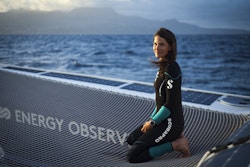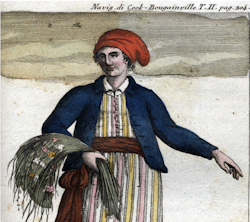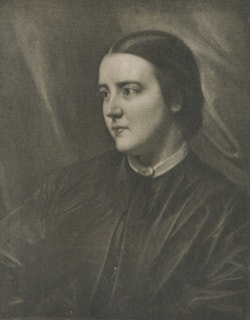Manifesto for more women in the preservation of the oceans
We need women on the sea. We need women scientists. We need women to care and protect our oceans. Katia Nicolet, scientist aboard Energy Observer and doctor in marine biology, looks back over her career and defends the importance of the role of women in the scientific and marine fields.
“My name is Katia Nicolet and I’m a doctor in marine science. I spent most of my adult life around the ocean, either sailing its waves or diving under its surface. I also became an expedition leader on passenger cruise ships after my PhD, leading expeditions across the Pacific and the Indian Ocean. As a woman, I am incredibly grateful to all the female pioneers that came before me and allowed me to take on these roles of scientist and leader. Still, it hasn’t been smooth sailing to get to where I am, and I’m often reminded that my position is peculiar for a woman. When you look at the history of discrimination against women, it’s not all that surprising that my position still shocks today.”

Feminism at the bottom of the wedge
Until the 1900s, the best way for a woman to get a job aboard a ship was to disguise herself as a man. Many women throughout the 1700s and 1800s have done so, sometimes spending over 10 years under their false identity. If their true self was revealed however, it was the end of their career. Jeanne Barret, for example, is known to be the first women to have sailed around the world between 1766 and 1769. Disguised as a man, she embarked on the Bougainville expedition as an expert botanist and assistant of the naturalist Philibert Commerson. When her gender could no longer be hidden, her and Commerson where disembarked in Reunion Island, before the end of the voyage.

Centuries later, women started carriers on the sea without false pretences. One of the first female to become captain of an ocean-going vessel was the Russian Anna Ivanova Shchetinina. In 1935, at the age of 27, she took her first voyage as captain from Hamburg to the Russian Far East around Europe, Africa and Asia. That was less than 100 years ago. Women’s maritime history has only just begun. All these intrepid and brave women had to face either the admiration or the disapproval of the “good people”, but in any case, they were judged. They were either singled out for being “exceptionally” brave women (meaning normal women couldn’t do what they did), or shunned for breaking the rules of “decent” society.
Women and Science: Chaotic Beginnings
The academic world hasn’t been kinder to women. For millennia, women were thought to have smaller, less developed brains than men. Women did not have access to the public space and were forced to stay in the domestic realm, taking care of the household and children. Even after women obtained the right to vote, their role in society evolved incredibly slowly. They could not be men’s equals, especially not in the academic and scientific world.
In 1870, Sophia Jex-Blake led a group known as the Edinburgh Seven in an effort to become the first women to graduate as doctors from a British university. Being militant and outspoken, she wrote an essay stating simply that there was no objective proof of women’s intellectual inferiority to men. She said this could easily be tested by granting women’s “a fair filed and no favour”, and then we will see.

One of the Edinburgh Seven, Edith Pechey, finished first in her chemistry class, and as such, should have been awarded the Hope Scholarship. But the scholarship was given to the person that came second, a male student. The simple fact that these women were attending university caused riots in the streets and the seven women had to brave crowds of angry protesters and have rubbish and mud thrown at their faces before they could reach their final exam room. They all passed their tests, but none of them received their qualification in England. They studied, did better than most men, but could not become medical doctors.
This seem like an issue from the past, but recently, in 2018, a scandal broke at the Tokyo Medical University when it was exposed that all female candidates that undertook their entry test had their score lowered by 20% and 20 points were added to the male candidates. All this ensured, for the past 10 years, that less women would be enrolled at university, and thus less would become doctors. Even in our western societies, women are still under-represented in most branches of science. In France, only 30% of scientists are females, and this number has only increased 2 to 3% in the past 20 years!
Variable geometry equality
This lack of female representation in the academic and maritime world creates a lack of role models for young girls. Often, we need to see something is possible before we even dare dreaming of it.
"My personal academic journey in Switzerland and Australia has been rather fair and I have never felt discriminated against because I was a woman. I had access to strong role models and my intellect was never questioned on the basis of my gender.
My research however, led me to work in places such as Saudi Arabia and Egypt. The Red Sea is an incredible system that has been relatively understudied. But conducting research in Saudi, comes with its complications when you’re a woman. I could not drive a car and had to wear a Hijab any time I stepped outside the university campus. A woman cannot speak to a man that isn’t from her family circle, so no stranger ever spoke to me or even looked at me in the eyes outside campus.This sends a strong message that women shouldn’t even be present in the public space, and if they are sometimes permitted to be there, they cannot have their voice heard. This fact oozes inside the other aspects of live, the university included, where women become less likely to ask questions, speak up or lead projects. Out of the 172 professors on campus, 18 only are females.Working on ships has been difficult in a different way, this time I clearly felt that my intellect and leadership was challenged, especially while working as an expedition leader. Even with the title of head of the department, the respect does not come naturally when you’re a female in your 30s. I have had captains pulling on my pony tail, saying “you remind me of my grand-daughter”, in front of passengers. I have had passengers calling me a “primary school teacher” because receiving safety rules and regulations from a young female made them feel like children. And I can’t tell you how many times I have had people telling me I needed to change career so that I could get married and have kids “before it’s too late”. Because that’s just how it is, when you’re a woman, people feel entitled to tell you how you should do your job, present yourself and even what you should or shouldn’t do with your ovaries.
Even 100 years after the first woman became captain, the maritime world remains mostly a male dominated industry. I have worked on commercial ships for 5 years and have never encountered a female captain or staff captain. The larger proportion of female working on cruise ships are in the housekeeping and entertainment department, or at the reception. Still, three quarters of the staff on board are typically men, and very few women become head of departments. And I believe that it is at the disadvantage of all of us. A Chinese saying goes: “Women hold half the sky”. By preventing women from living full lives in the career of their choice, we’re operating at on only half of humanity’s potential."
Manifesto
We need women on the sea. We need women scientists. We need women to care and protect our oceans. We need to show girls that a career at sea is possible, that they too came become captains, expedition leaders, scuba divers, surfers, marine biologists or maritime engineers. We need to stop telling little girls how pretty they look, but rather how strong, smart and brave they are. We need to show girls that the ocean is theirs as much as it’s the boys. As Sophia Jex-Blake put it, just give us that “fair field and no favour”, and then we’ll see.